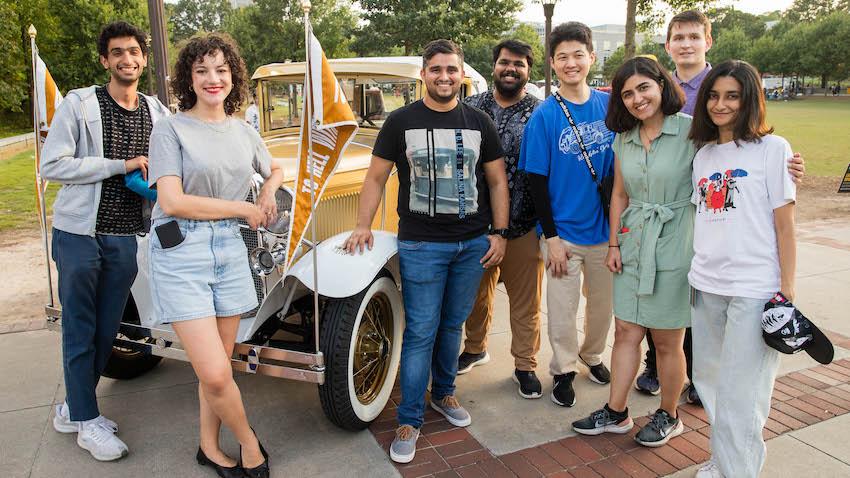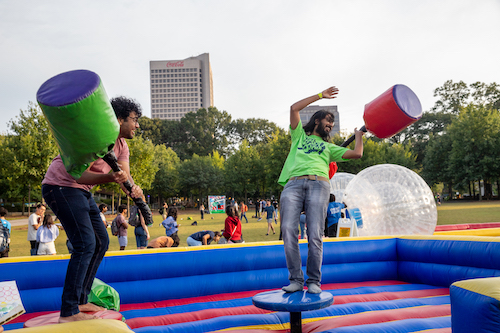
Student Organization Creates Community Within School
Since its founding three years ago, the School of Computer Science Graduate Student Association (SCS-GSA) has become a vital channel for social engagement, mentorship, and leadership development within the school.
The idea for the organization came about in the fall of 2020 to give students a sense of community during the COVID-19 pandemic. The SCS-GSA registered as an official campus student organization in early 2021.
The SCS-GSA held its first in-person event, a welcome celebration for the new semester, in September 2021. The event was memorable because it was the first time that many students and faculty members had seen each other in person since the start of the pandemic.
The event remains one of the SCS-GSA’s most significant events, with new and returning faculty and students enjoying fun, food, and games on Tech Green.
Along with the welcome celebration, the SCS-GSA hosts events for the SCS community throughout the year. These include group hikes, a year-end gala, and faculty panel discussions.

"We get to learn not just about their research, but also more about them, what motivated them to get into research, or how their background shaped their journey. We’ve also organized panels where students can learn more about academic jobs and the opportunities and responsibilities academia entails,” said Vaibhav Bhosale, SCS-GSA president and SCS Ph.D. student.
The organization is based in the SCS, but many of its members are students in the School of Cybersecurity and Privacy (SCP), and events are open to all Georgia Tech students.
“Since its creation, SCS-GSA has emerged as the community hub of our school. I am especially impressed by the dedication of the SCS-GSA officers and their thoughtfulness in organizing a wide range of events for students and faculty,” said SCS Chair Vivek Sarkar.
“Their social events such as fireside chats with graduate alumni, student poster sessions, lunch with labs, and even a panel on learning from failures benefit everyone in our college.”
[RELATED: Vivek Sarkar Named Dean of Georgia Tech's College of Computing]
SCS-GSA leaders say the organization’s main goal has been to increase student participation in school activities and provide a community for students. The group has also allowed for a more open and effective dialogue with School leadership and faculty. This year, the GSA created a survey for Ph.D. students on their opinions on their program, workload, and any other concerns they might have, with the results being sent to faculty.
One of the SCS-GSA’s new initiatives is a student mentorship program, which pairs first-year Ph.D. students with senior students.
“Everyone I've talked to has found it useful. I think it helped because we tried to do the assignments so that people are paired with mentors from the same area, but not from the same lab,” said SCS Ph.D. student Marina Vemmou, SCS-GSA faculty affairs co-chair.
“When I joined Georgia Tech, it wasn’t easy to meet anyone who's not under my advisor, and it can be useful to know people in different circles. Everyone I've spoken with has met with their mentors at least once, and at least they have another point of contact in the school,” Vemmou added.
Most members agree that the organization has helped them meet new people and socialize when they might not have otherwise.
“It helps because, as Ph.D. students, our lives are very isolated. We're always sitting in our labs doing our work and don't have much opportunity to go out and talk to other Ph.D. students who are not directly working with us. At the GSA events, you get a chance to meet new people and make friends,” said SCP Ph.D. student Akshaya Kumar, SCS-GSA faculty affairs co-chair.
The SCS-GSA has become a valuable asset for the school community. The organization hopes to continue growing while fostering social connections, leadership skills development, and mentorships.
“Once you finish your Ph.D., a lot of what you might do next will require leadership skills for your roles, whether you go to academia or industry. Taking on a leadership role in the GSA is a great way to gain those skills,” Bhosale said.
As computing revolutionizes research in science and engineering disciplines and drives industry innovation, Georgia Tech leads the way, ranking as a top-tier destination for undergraduate computer science (CS) education. Read more about the college's commitment:… https://t.co/9e5udNwuuD pic.twitter.com/MZ6KU9gpF3
— Georgia Tech Computing (@gtcomputing) September 24, 2024


